-
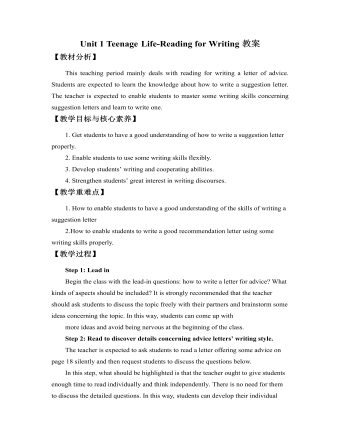
新人教版高中英语必修1Unit 1 Teenage Life-Reading for Writing教案
【教材分析】This teaching period mainly deals with reading for writing a letter of advice. Students are expected to learn the knowledge about how to write a suggestion letter. The teacher is expected to enable students to master some writing skills concerning suggestion letters and learn to write one.【教学目标与核心素养】1. Get students to have a good understanding of how to write a suggestion letter properly.2. Enable students to use some writing skills flexibly.3. Develop students’ writing and cooperating abilities.4. Strengthen students’ great interest in writing discourses.【教学重难点】1. How to enable students to have a good understanding of the skills of writing a suggestion letter2.How to enable students to write a good recommendation letter using some writing skills properly.【教学过程】Step 1: Lead in Begin the class with the lead-in questions: how to write a letter for advice? What kinds of aspects should be included? It is strongly recommended that the teacher should ask students to discuss the topic freely with their partners and brainstorm some ideas concerning the topic. In this way, students can come up with more ideas and avoid being nervous at the beginning of the class.Step 2: Read to discover details concerning advice letters’ writing style.The teacher is expected to ask students to read a letter offering some advice on page 18 silently and then request students to discuss the questions below.
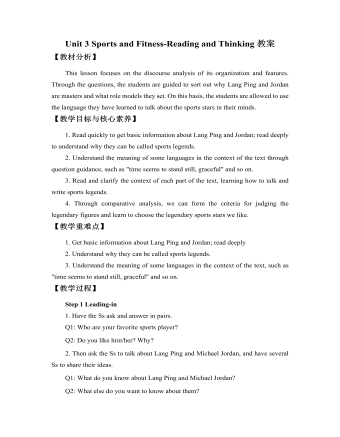
新人教版高中英语必修1Unit 3 Sports and Fitness-Reading and Thinking教案
2. Sort out detailed information about Michael Jordan.(1) Understand the transitional sentence.Q: Which part is about Michael Jordan as a master? Which part is about the example he set?(2) Have the Ss Focus on why Michael Jordan is a master and what good examples Michael Jordan set when they’re reading. And think about these questions as below:Q1: How does the author describe his impressive skills?Q2: How do you understand “time seemed to stand still”?Q3: What does “graceful” mean?Q4. Which sentence do you think best describes his mental strength?Q5. Which words is important in the sentence in describing his mental strength? Why?Q6: How do you understand “unique”?Q7: What can we learn from Michael Jordan?Step 5 Discussing and recommendingRecommend their own living legends of sports.Work in groups to choose your own living legend of sports and give the reasons of your choice. Step 6 HomeworkReview the stories of Lang Ping and Michael Jordan, and try to retell them.
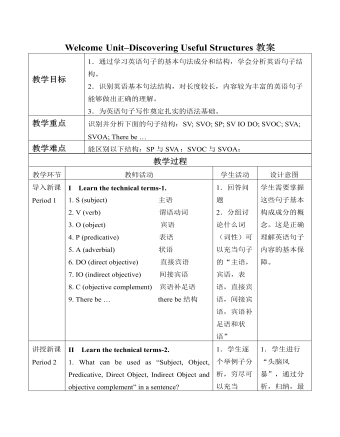
新人教版高中英语必修1Welcome Unit-Discovering Useful Structures教案
II Learn the technical terms-2.1. What can be used as “Subject, Object, Predicative, Direct Object, Indirect Object and objective complement” in a sentence?2. What can be used as “adverbial” in a sentence?3. What can be used as “verb” in a sentence?Answers to questions 1-3:1. Nouns, pronouns and appellations can be used as “Subject, Object, Predicative, Direct Object, Indirect Object and Objective Complement”. Besides, adjectives can be used as “Predicative and Objective Complement” in a sentence.2. Adverbs and prepositional phrases can be used as “Adverbial”.3. Verbs with actual meaning can be used as “Verb” in a sentence. Auxiliary verbs alone cannot be used as “Verb” in a sentence.III Learn to recognize the sentence structures.1. SV structure. For Example:(1) A bird flies.S V(2) A monkey jumps.S V(3) A fish swims.S V√ In SV structures, verbs are “intransitive verbs”.2. SVO structure. For Example:(1) A sheep eats grass.S V O(2) They like bananas.S V O(3) He wants candy.S V O√ In SVO structures, verbs are “transitive verbs”.3. SP structure. For Example:(1) This is great.S P (2) He looks well.S P (3) She became a teacher.S P √ In SP structures, Predicatives are formed by “link verbs” and “adjectives or nouns”.√ link verbs: be, become, grow, look, feel, taste, etc.4. SV IO DO structure. For Example:(1) He asked me a question.S V IO DO(2) Danny wrote me a letter.S V IO DO(3) Billy brought Sam a kite.S V IO DO√ In SV IO DO structures, the verbs are transitive and are followed by two objectives – pronouns or nouns as Indirect Objective, and nouns as Direct Objectives.
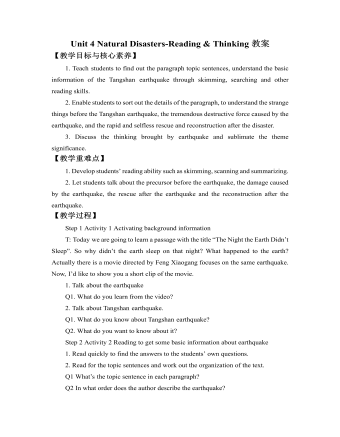
新人教版高中英语必修1Unit 4 Natural Disasters-Reading & Thinking教案
5. Read to get detailed information about Paragraph 5.Q1. What shows the revival of Tangshan?Q2. How can Tangshan revive itself and get up on its feet again?Q3. In times of disasters, how can we go through it?T: In times of disasters, we should unify, show the wisdom and stay positive.Step 4 Activity 4 Highlighting the theme and reflecting1. Make a summary of the text.2. Further understand the titleQ: After our learning, why do you think the earth didn’t sleep on that night?T: An earthquake happened. The people in the earthquake suffered a lot, and the people outside Tangshan were concerned about the people there a lot.3. Reflect through discussion on what can be learnt after reading.T: Disasters are powerful. Unpreparedness can be deadly. Life is weak, but if people work together to help each other, disasters can be defeated.There is no love from disaster, but we have love in the human heart.Step 5 Assignment How does the writer convey that the earthquake was deadly, and that people were helpless during the earthquake? Try to find some attractive and impressive expressions and note them down.
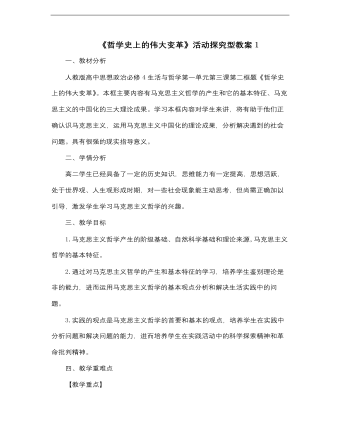
高中思想政治人教版必修四《哲学史上的伟大变革活动探究型》教案
一、教材分析人教版高中思想政治必修4生活与哲学第一单元第三课第二框题《哲学史上的伟大变革》。本框主要内容有马克思主义哲学的产生和它的基本特征、马克思主义的中国化的三大理论成果。学习本框内容对学生来讲,将有助于他们正确认识马克思主义,运用马克思主义中国化的理论成果,分析解决遇到的社会问题。具有很强的现实指导意义。二、学情分析高二学生已经具备了一定的历史知识,思维能力有一定提高,思想活跃,处于世界观、人生观形成时期,对一些社会现象能主动思考,但尚需正确加以引导,激发学生学习马克思主义哲学的兴趣。三、教学目标1.马克思主义哲学产生的阶级基础、自然科学基础和理论来源,马克思主义哲学的基本特征。2.通过对马克思主义哲学的产生和基本特征的学习,培养学生鉴别理论是非的能力,进而运用马克思主义哲学的基本观点分析和解决生活实践中的问题。3.实践的观点是马克思主义哲学的首要和基本的观点,培养学生在实践中分析问题和解决问题的能力,进而培养学生在实践活动中的科学探索精神和革命批判精神。
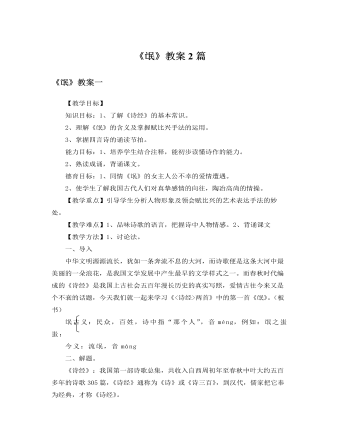
人教版高中语文必修2《氓》教案2篇
从《诗经》的现实主义到屈原的浪漫主义,是中国诗歌发展的一个里程碑。屈原的骚体诗,依诗取兴,引类譬喻,继承发展了《诗经》的比兴传统。《诗经》的比兴较为单纯,而《楚辞》的比兴具有象征的特质,往往成为一个形象的系统。《离骚》中香草美人的比兴就是范例。楚地本是泽乡山国,其间颇有叠波旷宇、崇山秀岭,这些江山的光怪之气足以摇荡心灵、催发丽辞伟句。但骚体诗已冲破《诗经》四言诗的固定格式,句式加长而灵活,篇章放大而严密,诗采绚丽而贴切,是《诗经》之后的一次诗体大解放。有人说,中国历代诗“莫不同祖风骚”,足见其对后代诗歌的影响。先秦时代,《诗经》与《楚辞》双峰并峙,是中国诗史上现实主义与浪漫主义的两座巍然屹立的坐标。
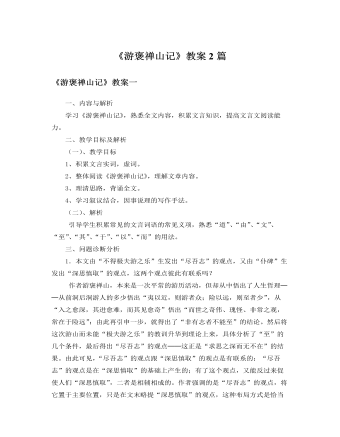
人教版高中语文必修2《游褒禅山记》教案2篇
1.本文由“不得极夫游之乐”生发出“尽吾志”的观点,又由“仆碑”生发出“深思慎取”的观点,这两个观点彼此有联系吗?作者游褒禅山,本来是一次平常的游历活动,但却从中悟出了人生哲理──从前洞后洞游人的多少悟出“夷以近,则游者众;险以远,则至者少”,从“入之愈深,其进愈难,而其见愈奇”悟出“而世之奇伟、瑰怪、非常之观,常在于险远”;由此再引申一步,就得出了“非有志者不能至”的结论。然后将这次游山而未能“极夫游之乐”的教训升华到理论上来,具体分析了“至”的几个条件,最后得出“尽吾志”的观点──这正是“求思之深而无不在”的结果。由此可见,“尽吾志”的观点跟“深思慎取”的观点是有联系的:“尽吾志”的观点是在“深思慎取”的基础上产生的;有了这个观点,又能反过来促使人们“深思慎取”,二者是相辅相成的。

人教版高中语文必修3《林黛玉进贾府》教案2篇
2、黛玉进入贾府到贾母处,她看到了什么?提示:从荣府西角门进去,走“一射之地”,转至垂花门,过穿堂,绕插屏,再经三间过厅,后面方是贾母居住的正房大院。“正面五间上房,皆雕梁画栋,两边穿山游廊厢房,挂着各色鹦鹉、画眉等鸟雀。”这样穿堂过厅一路行来,仆役、婆子、丫环轮番更换,的确给人以侯门深似海的感觉。然而贾母居处还不是正内室。3、黛玉去拜见二舅舅时又看到什么?提示:往东。“穿过一个东西的穿堂,向南大厅之后,仪门内大院落,上面五间大正房,两边厢房鹿顶耳房钻山,四通八达,轩昂壮丽”。堂屋中迎面“一个赤金九龙青地大匾,匾上写着斗大的三个大字,是‘荣禧堂’,后有一行小字:‘某年月日,书赐荣国公贾源’,又有‘万几宸翰之宝’。”屋内摆设有名贵的家具,珍贵的字画、古玩。“又有一副对联,乃乌木联牌,镶着錾银的字迹,道是:座上珠讥昭日月,堂前黼黻焕烟霞。”由堂屋进入东耳房,这里是起居室,另有一番布置,再到东廊三间小正房王夫人的住室,又别有摆设。
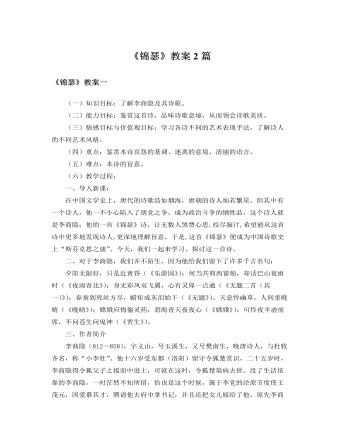
人教版高中语文必修3《锦瑟》教案2篇
【参考】“沧海月明珠有泪,蓝田日暖玉生烟。”沧海中的珍珠只有在明月之夜,才能流下晶莹的泪花;蓝田下的美玉只有在日暖之时,才能升腾飘逸的烟霞。物犹如此,人当如是。“沧海月明”与“蓝田日暖”优美意境的创设,不仅仅是诗人精妙绝伦艺术素养的表现和挥洒,更是诗人回答人生价值的标准和尺度。诗人以物推人,拓展深化了诗作的主题,整篇的闪光点在此,魂亦在此。【参考】“此情可待成追忆,只是当时已惘然。”追忆过去,尽管自己以一颗浸满血泪的真诚之心,付出巨大的努力,去追求美好的人生理想,可“五十弦”如玉的岁月、如珠的年华,值得珍惜之时却等闲而过;面对现实:恋人生离、爱妻死别、盛年已逝、抱负难展、功业未建……,幡醒悟之日已风光不再。如泣如诉的悲剧式结问,又让诗人重新回到对“人生价值到底是什么?到底该怎样实现?”深深的思考和迷惑之中,大大增强了诗作的震撼力。
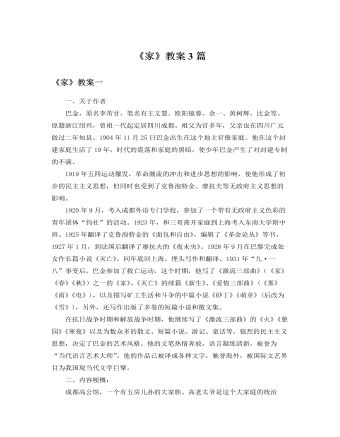
人教版高中语文必修2《家》教案3篇
(幻灯六)巴金作品《家》描写的是“五四”之后,成都地区一个封建大家庭走向崩溃的故事。故事集中在1920年冬到1921年秋的八九个月时间里。成都的一个官僚地主家庭高公馆,一家之主的高老太爷,封建专制,顽固不化。长房长孙觉新,为人厚道,却很软弱,原与梅表姐相爱,后屈从于老太爷之命而与李瑞珏结婚。后来梅和瑞珏双双惨死。觉新的胞弟觉民、觉慧积极参加爱国运动,从而和冯公馆的冯乐山成了死对头。觉民爱上琴,冯乐山却要他娶自己的侄孙女,在觉民觉慧的反抗下,他们终于取得胜利。觉慧爱上聪明伶俐的婢女鸣凤,但冯乐山却指名要娶鸣凤为妾,鸣凤坚决不从,投湖自尽…至此,觉新有所觉醒,而觉慧则毅然脱离家庭,投身革命。(故事主要以高家三兄弟的爱情遭际为线索。)
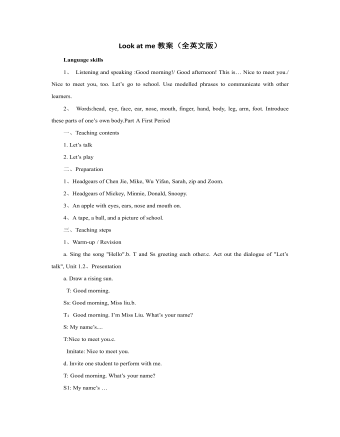
人教版新课标PEP小学英语三年级上册Look at me教案(全英文版)
3、Practicea. Nice to meet you. Nice to meet you,too.b. Perform the dialogue.c. Arrange the dialogue according to the pictures or sentence cards.d. Let’s play.A: Good afternoon,B. This is C. Hello, C! Nice to meet you.C: Nice to meet you, too.A,B: Goodbye!C: Bye!4、Assessment Workbook page 10Add-activitiesa. Listen to the recording and repeat.b. Make a dialogue according to "Let’s talk".Second Period一、Teaching contents1. Let’s learn Words:body, leg, arm, hand, finger, foot.1. Let’s do二、Preparation1、a puppet2、Cards of body, leg, arm, hand, finger and foot.3、headgear of a captain三、Teaching steps1、Warm-up/ Revisiona. Captain says to review "let’s do" of Part A.b. Perform the students their own dialogues.2、Presentationa. Learn to say "body, leg, arm, hand, finger and foot."b. Listen to the recording and repeat.c. Let’s do. Clap your hands. Snap your fingers. Wave your arms. Cross your legs. Shake your body. Stamp your foot.3、Practicea. Let’s draw a person.b. Let’s do. Point out which picture.c. Let’s do. Who responses faster.4、Assessment Workbook page 115、Add-activitiesa. Listen to the recording, repeat and act out.b. Say all the names of the body to your parents.Third Period一、Teaching contents1. Let’s check2. Let’s chant二、Preparation1、stationeries1、pictures of parts of Zoom
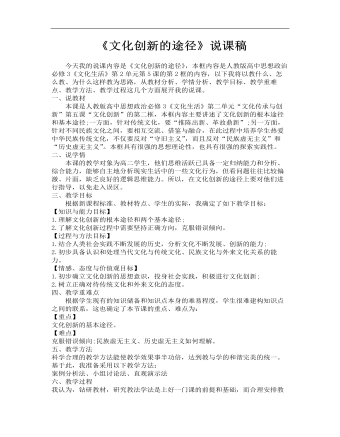
高中思想政治人教版必修三《文化创新的途径》说课稿
二、说学情本课的教学对象为高二学生,他们思维活跃已具备一定归纳能力和分析、综合能力,能够自主地分析现实生活中的一些文化行为,但看问题往往比较偏激、片面,缺乏良好的逻辑思维能力。所以,在文化创新的途径上要对他们进行指导,以免走入误区。三、教学目标根据新课程标准、教材特点、学生的实际,我确定了如下教学目标:【知识与能力目标】1.理解文化创新的根本途径和两个基本途径;2.了解文化创新过程中需要坚持正确方向,克服错误倾向。

新人教版高中英语必修3Unit 1 Festivals and Celebrations-Listening &Speaking&Talking教学设计
The theme of this section is “Talk about festival activities and festival experiences”.Festival and holiday is a relaxing and interesting topic for students. This part talks about the topic from the daily life of students’. In the part A ---Listening and Speaking, there are three conversations among different speakers from three countries(Japan, Rio and China), where the speakers are participating in or going to participate in the festivals and celebrations. So listening for the relationship among them is a fundamental task. Actually, with the globalization and more international communication, it is normal for Chinese or foreigners to witness different festivals and celebrations in or out of China. In the Conversation 1, a foreign reporter is interviewing a Japanese young girl who just had participated in the ceremony of the Coming-of-Age Day on the street and asking her feeling about the ceremony and the afterwards activities. Conversation 2, Chinese girl Li Mei is witnessing the Rio Carnival for the first time, and her friend Carla gives her some advice on the costumes which enables her to match with the carnival to have a good time. Conversation 3, a Chinese guide is showing a group of foreign visitors around the Lantern Festival and introducing the customs of the festival to them. The three conversations have a strong vitality and insert the festival and cultural elements from different countries. So perceiving the festivals and cultures from different countries is the second task. At the same time, the scripts also insert the targeted grammar --- v-ing as attributive and predicative, which students can perceive and experience in a real context and make a road for the further study. That is the third task. In the Part B--- Listening and Talking, the theme is “Talk about festival experience”, which is the common topic in our daily conversations. During the conversation, Song Lin, a Chinese student, asked Canadian friend Max about how to spend Christmas. In the conversation, Song Lin talked about experience and the feelings during the Chinese Spring Festival, during which there are not only some enjoyable things but some unpleasant things. After the listening, perhaps students find there are some similarities between Christmas and the Chinese Spring Festival as there are some differences in the origins and celebrations. For example, people always visit friends and relatives, decorate their houses, have a big dinner together, chat and give presents to each other.

新人教版高中英语必修3Unit 4 Space Exploration-Listening&Speaking&Talking教学设计一
Listening and Speaking introduces the topic of “talking about how to become an astronaut”. This period is aimed to inform students some details about the requirements of being an astronaut. Students can be motivated and inspired by the astronauts. Teachers ought to encourage students to learn from them and let them aim high and dream big.Listening and Talking introduces the theme of "talk about life in space". This part also informs students more details about life in space and can inspire students to be curious about this job. 1. Guide students to listen for numbers concerning dates, years and ages etc2. Cultivate students' ability to talk about how to become an astronaut and life in space ; 3. Instruct students to use functional sentences of the dialogue such as “ first of all, I am not sure, so what might be .. I guess.. I wonder…I am curious…)appropriately.1. Guide students to understand the content of listening texts in terms of the whole and key details; 2. Cultivate students' ability to guess the meaning of words in listening; discuss with their peers how to become a qualified astronaut and describe the life in space.Part 1: Listening and SpeakingStep 1: Lead inPredictionThe teacher can ask students to predict what the listening text is about by looking at the pictures.About how to become an astronaut./the requirements of an astronautStep 2: Then, play the radio which is about an interview a. And after finishing listening for the first time, the students need to solve the following tasks.

新人教版高中英语必修3Unit 3 Diverse Cultures-Listening &Speaking&Talking教学设计
1. In Picture 1 and Picture 2, where do you think they are from? How do you know?From their wearings, we can know they are from ethnic minority of China--- Miao and Dong.Picture 1, they are playing their traditional instrument lusheng in their traditional costumes.Picture 2. the girls are Miao because they wear their traditional costumes and silver accessory.2. In Picture 3, can you find which village it is? What time is it in the picture?It is Dong village. It is at night. Step 2 While-listeningJustin met a new friend while traveling in Guizhou. Listen to their conversation and complete the summaries below.Part 1Justin and Wu Yue watched some Miao people play the lusheng. The instrument has a history of over 3,000 years and it is even mentioned in the oldest collection of Chinese poetry. Then they watched the lusheng dance. Justin wanted to buy some hand-made silver/traditional accessories as souvenirs. He was told that the price will depend on the percentage of silver. Part 2They will go to a pretty Dong minority village called Zhaoxing. they will see the drum towers and the wind and rain bridges. They may also see a performance of the Grand Song of the Dong people.Step 3 Post-listening---TalkingWork in groups. Imagine Justin is telling some friends about his trip to Guizhou. One of you is Justin and the rest of you are his friends. Ask Justin questions about his trip and experience. The following expressions may help you.

新人教版高中英语必修3Unit 4 Space Exploration-Listening&Speaking&Talking教学设计二
The themes of this part are “Talk about how to become an astronaut” and “Talk about life in space”. As Neil Armstrong said “Mystery creates wonder and wonder is the basis of man’s desire to understand. Space is difficult for human to reach, therefore, humans are full of wonders about it. However, if wanting to achieve the dream of reaching the Moon, some of our human should work hard to be an astronaut at first. Part A(Talk about how to become an astronaut) is a radio interview in a radio studio, where the host asked the Chinese astronauts about his story how to become an astronaut. Yang Liwei told his dreamed to be an astronaut since childhood. Then he worked hard to get into college at 22. The next 10 years, he gradually became an experienced pilot. At the same time, to be an astronaut, he had to study hard English, science and astronomy and trained hard to keep in good physical and mental health and to practise using space equipment. Part B (Talk about life in space) is also an interview with the astronaut Brown, who is back on the earth. The host Max asked about his space life, such as his emotion about going back the earth, the eating, shower, brushing, hobbies and his work. Part A and Part B are interviews. So expressing curiosity about the guests’ past life is a communicative skill, which students should be guided to learn.1. Students can get detailed information about how Yang Liwei became an astronaut and Max’s space life.2. Students learn to proper listening strategy to get detailed information---listening for numbers and taking notes.3. Students can learn related sentences or phrases to express their curiosity like “ I wish to know...” “I’d love to know...”4. Students can learn more about the space and astronauts, even be interested in working hard to be an astronaut

新人教版高中英语必修3Unit 5 The Value of Money-Listening &Speaking&Talking教学设计
4. A:We’d like to have someone to say a word at the beginning to welcome the group.B:↙Who?A:We thought that you or Dr.Johnson might do it.B用降调说Who,其意思是问,对方想让谁在开场时致欢迎词。Step 6 Pronunciation---Practice1. Listen to the short conversation and mark the intonation with ↗, ↙ or ↙, ↗. Then discuss with a partner what they intend to convey by using different intonation.Owner: You know what ?↗ It’s a million-pound bank note↙.Waiter 1: Really ?↗(question)Waiter 2: Really !↙(unbelievable and surprised)Waiter 3: Really ?!↙↗(first question then surprised)2. Listen to the conversations. Underline the parts that are stressed and mark the intonation. Then talk about the implied meanings of the responses with different intonations. Listen again and repeat.1) Henry: It’s a nice suit.Owner: Oh, it’s perfect!↙(The intonation means it is very suitable for Henry.)2) Henry: Well, that’s very kind of you.Owner: Kind, sir ?↗(what you said is not right) No, it’s kind of you. You must come whenever you want and have whatever you like. Just having you sit here is a great honour !!↙(welcome you to come again)3)Henry:Well, to be honest, I have none. Oliver:(happily) What luck!(excited) Brother↗, what luck!↙(It means “Didn’t you hear it?”)Henry: Well, it may seem lucky to you but not to me!↗(angry) If this is your idea of some kind of joke, I don’t think it’s very funny. Now if you’ll excuse me, I ought to be on my way.↙(If so, I would leave.)Roderick: Please don’t go↙...(hope Henry can wait for a moment)Part B Viewing and Talking---Describe people’s changing attitudes in a film clipStep 1 Before-listening---Tell the filmYou are going to watch part of the film The Million Pound Bank Note. Look at these photos and guess what happens in the film.

新人教版高中英语必修3Unit 5 The Value of Money-Listening &Speaking教学设计
Step 4: Listen again and decide if the following statements are true (T) or false (F).1 It was the first time Chen Liyan's story was reported. T口 F口2 Chen found 10,000 yuan in a small plastic bag in Taiyuan railway station口 F口3 Wang Zheng apologized to Chen because he couldn't offer her more money. T口 F口4 Chen took out a large loan to cure her daughter, T口 F口5 Wang set up a fundraising website for Chen's daughter after Chen told him about her situation. T口 F口Step 5:After listening, discuss the questions.1 What kind of person do you think Chen Liyan is?Chen Liyan is generous and honest because she returned a large sum of money to the owner.2 Did Chen return the money because she didn't need it?No. She returned the money because it was the right thing to do. Evidence for this is that she refused to accept the reward money because she felt that it had not been earned. 3 Is it common for people to do what Chen did?It depends on the culture. In some countries it is quite common to return money that has been found. In other countries, people believe "Finders are keepers!" 4 How did Wang Zheng feel about the return of his money?He must have been very happy and relieved to have gotten his money back. We know this because he thanked Chen repeatedly and even offered her a reward.5 Why did Ma Dongbao tell Wang about Chen's family?He must have had great sympathy for Chen and her daughter and wanted to help them.'We know this because he arranged help for them. 6 How did the news reporter feel about Chen's actions?The news reporter felt that it showed that money wasn't the most important thing in life. We know this because the reporter told us that this is what Chen believes. and then said, “that's a great attitude to take."
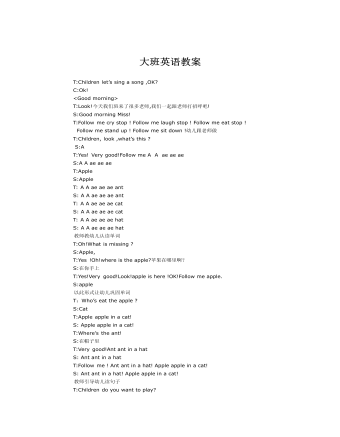
英语公开课教案
<Good morning> T:Look!今天我们班来了很多老师,我们一起跟老师打招呼吧! S:Goodmorning Miss! T:Follow mecry stop ! Follow me laugh stop ! Follow me eat stop ! Follow me stand up ! Follow me sit down !幼儿跟老师做 T:Children,look ,what’s this ? S:A T:Yes! Verygood!Follow me A A ae ae ae S:A A ae aeae T:Apple S:Apple T: A A ae aeae ant S: A A ae aeae ant T: A A ae aeae cat S: A A ae aeae cat T: A A ae aeae hat S: A A ae aeae hat
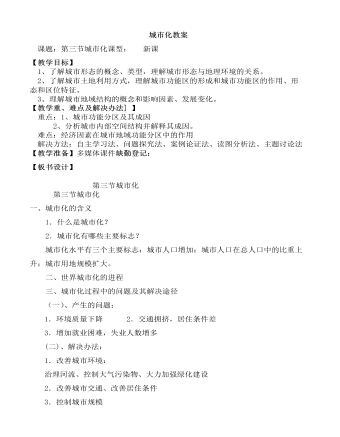
人教版高中地理必修2城市化教案
读《环境污染组图》思考:造成交通拥挤的原因是什么?有什么危害?(原因:汽车的增加、汽车数量与道路状况的比值越来越大造成的。危害:交通阻塞,导致时间和能源的严重浪费,影响城市环境质量。)3.增加就业困难,失业人数增多思考:产生这个问题的原因是什么?(随着城市化发展,城市科学技术提高,机器化大生产使劳动者数量要求降低,城市人口本来就未充分就业,再加上乡村人口大量涌入,导致失业人数增多。)二、解决办法:(以上海市为例,讲解解决的办法。)1.改善城市环境:治理河流、控制大气污染物、大力加强绿化建设为改善城市环境,上海市全面展开对大气、河流、噪声等多方面的治理工作。如苏州河的治理、降低城市污染物浓度、加强绿化建设,截止1990年,市区绿化覆盖率达到20.3%。